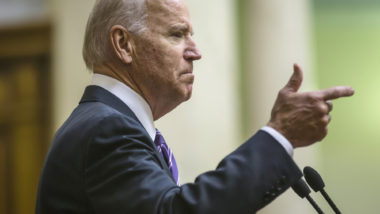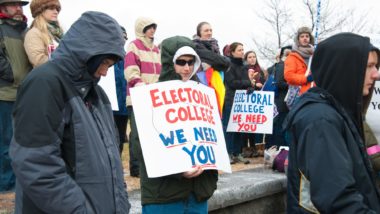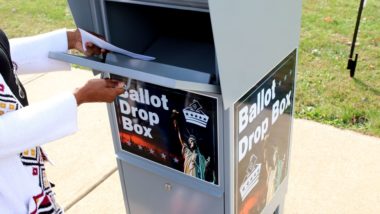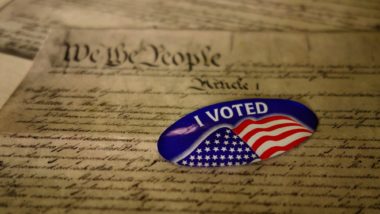Top Class Actions’s website and social media posts use affiliate links. If you make a purchase using such links, we may receive a commission, but it will not result in any additional charges to you. Please review our Affiliate Link Disclosure for more information.
UPDATE: On Dec. 11, 2020, the U.S. Supreme Court rejected a Texas lawsuit seeking to overturn the election results for President-elect Joe Biden.
The attorneys general for the four states that Texas wants the Supreme Court to disqualify from the Electoral College this year are fighting back, calling the case against them mere “gamesmanship,” at best, and dangerous and seditious at worst.
All four have filed briefs in response to Texas Attorney General Ken Paxton’s petition to the Supreme Court on Monday calling for their states’ election results to be set aside and their electoral votes uncounted. Each urges the Supreme Court to throw out the case that is trying to overturn an election that President Donald J. Trump lost, and not the millions of votes their residents cast bringing about that outcome.
Paxton’s petition claims election officials in Georgia, Michigan, Pennsylvania and Wisconsin made changes to the election process in those states – mainly having to do with expanded mail-in voting in response to the ongoing coronavirus pandemic – they were not legally empowered to make. Trump lost the election to Democratic challenger Joseph R. Biden in each of those states. Paxton is not suing to have the results in any state that Trump won disqualified.
“Texas’s effort to get this court to pick the next president has no basis in law or fact,” Pennsylvania Attorney General Josh Shapiro wrote in the commonwealth’s response. “The court should not abide this seditious abuse of the judicial process, and should send a clear and un- mistakable signal that such abuse must never be replicated.”
Christopher M. Carr, the Republican attorney general of Georgia, wrote in his response to the Supreme Court that his state did exactly and only what it was legally allowed, and required, to do in administering the election there – all “in the face of logistical challenges” created by the pandemic.
After the election was held, Georgia’s results were highly scrutinized and subjected to a recount. The election results were confirmed “again and again and again,” Carr wrote. “Yet Texas has sued Georgia anyway.”
“Texas’s claims are no different than the multiple cases pressed in state and federal courts in Georgia over the past weeks … alleging that state election officials violated the law,” Carr says. None of those cases has been successful.
The Michigan, Pennsylvania and Wisconsin briefs level many of the same claims and make many of the arguments against the Texas petition. All four characterize Texas’ goal of disenfranchising all voters from the four targeted states as extreme, extraordinary, and legally unsound.
“Wisconsin has conducted its election and its voters have chosen a winning candidate for their state … Texas’s claims have no merit … and its basic arguments about how Wisconsin state law works are flat out wrong,” the Wisconsin brief says.
Michigan’s brief, as the others do, also makes the argument that Texas officials waited until the last minute to move against the targeted states. The Electoral College is set to convene Dec. 14. Paxton filed his petition Dec. 7.
And Pennsylvania Attorney General Josh Shapiro argued, along with the others, that Texas could only sue if it were harmed by the actions of the other states. Paxton’s petition says the harm is that Texas’ electoral votes will be “diluted” by those from the four states he claims held unlawful elections.
Paxton, a vocal Trump supporter, is not seeking to invalidate the wins of any of the down ballot candidates for Congress in the four states, only Biden’s victory.
“Texas has not suffered harm simply because it dislikes the result of the election, and nothing in the text, history, or structure of the Constitution supports Texas’s view that it can dictate the manner in which four other states run their elections,” Shapiro wrote.

He and some Republican supporters at the state and federal level have been fighting in the courts, and in the court of public opinion, to contest and overturn the election results.
While dozens of lawsuits and petitions in that vein have been dismissed, rejected or lost, the campaign persists.
The majority of Republican members of Congress have refused to say publicly that Biden is the president-elect and a number of them have encouraged Trump’s efforts. So have many Republican state leaders. To that end, the day after Paxton filed his petition at the Supreme Court, 17 other states – Alabama, Arkansas, Florida, Indiana, Kansas, Louisiana, Mississippi, Missouri, Montana, Nebraska, North Dakota, Oklahoma, South Carolina, South Dakota, Tennessee, Utah and West Virginia – and 106 members of Congress filed briefs in support of the action Tuesday. Then Trump himself filed legal paperwork to try to join the litigation.
By Friday, the names of another 20 Republican members of Congress, including House Minority Leader Kevin McCarthy of California, were added to the brief in support of the Texas petition. That means 126 of the 196 Republicans in the House of Representatives support disqualifying the voters of Georgia, Michigan, Pennsylvania and Wisconsin from the 2020 presidential election.
The Texas petition against the four battleground states insists election officials there took advantage of the coronavirus pandemic to change election laws and weaken ballot integrity, and “flooded their citizenry with tens of millions of ballot applications and ballots.” Their actions “made the 2020 election less secure,” Paxton wrote.
In Shapiro’s response on behalf of Pennsylvania, the Democratic attorney general says Trump’s ongoing attempts to overturn the election results and the “remedy” Texas is seeking are the real threat.
“Texas seeks to invalidate elections in four states for yielding results with which it disagrees,” the Pennsylvania response says. “Its request for this court to exercise its original jurisdiction and then anoint Texas’s preferred candidate for president is legally indefensible and is an affront to principles of constitutional democracy.”
Did you vote in Pennsylvania, Georgia, Michigan or Wisconsin? Do you think your state’s election results should be disqualified? Tell us about it in the comment section below.
The Election Results Lawsuit is State of Texas v. Commonwealth of Pennsylvania, et al., in the Supreme Court of the United States.
Read About More Class Action Lawsuits & Class Action Settlements:
















One thought on States Targeted by Texas Attorney General Urge SCOTUS to Toss His Case, Not Their Election Results
I voted in Georgia and am concerned. I fear my vote was tossed out. I need this court case to go through.